Catégories
Documents disponibles dans cette catégorie (237)
 Ajouter le résultat dans votre panier Affiner la recherche
Ajouter le résultat dans votre panier Affiner la recherche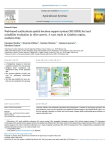
Article
G. Modica ; M. Pollino ; G. Messina ; S. Lanucara ; S. Praticò |CONTEXT - Effective and sustainable agricultural land management is essential for developing agriculture and food production. Olive trees are among the most significant cultivated plants in the Mediterranean region. Yet, they are especially vuln[...]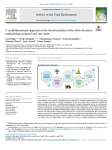
Article
L. Regni ; P. Sdringola ; B. Torquati ; N. Evangelisti ; M. Chiorri ; L. Arcioni ; P. Proietti |The productive sectors related to agriculture have the potential to contribute significantly to the energy transition. The paper describes an in-depth investigation on the extra virgin olive oil production towards the decarbonization of the sect[...]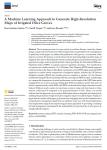
Article
The increasing severity of water scarcity in southern Europe, caused by climate change, requires advanced and more efficient approaches to agricultural water management. In particular, in this paper, we address this problem for olive groves-a co[...]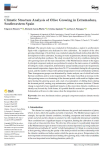
Article
The present study was conducted in Extremadura, a region in southwestern Spain with a significant area dedicated to olive cultivation. An analysis of the olive growing climatology of its territory was conducted using bioclimatic indices that aff[...]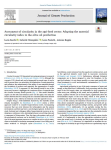
Article
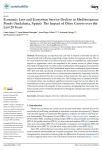
Article
G. Ortega ; J.M. Barragán ; J.D. Gilbert ; F. Ortega ; F. Guerrero |Wetlands play an important role, not only in relation to diversity but also to human health and well-being, supporting a large number of ecosystem services. One of the most important losses of wetland ecosystem values is established by anthropog[...]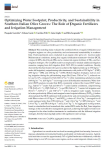
Article
P. Garofalo ; L. Gaeta ; C. Vitti ; L. Giglio ; R. Leogrande |This modeling study evaluates the combined effects of organic fertilization and irrigation regimes on olive productivity and environmental sustainability in southern Italy. Field experiments were conducted in an organic olive grove (cv. Leccino)[...]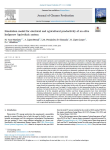
Article
Given the need to promote a more sustainable energy model that contributes to the fight against Climate Change and the consequent advancement of photovoltaics, Agrivoltaics is presented as a solution to the conflict over land use, since it makes[...]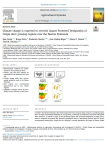
Article
I. Guise ; B. Silva ; F. Mestre ; J. Munos-Rojas ; M.F. Duarte ; J.M. Herrera |CONTEXT The Iberian Peninsula is the world's largest olive (Olea europaea subsp. europaea L.) producing region due to its high environmental suitability for olive growing, consistently accounting for about half of the global share. Moreover, it [...]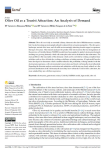
Article
Olive oil is not only an essential culinary element in the diet of Mediterranean countries, but it is also becoming an increasingly attractive element from a tourism perspective. The olive grove landscape, ancient olive trees, and oil mills are [...]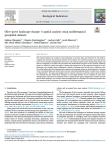
Article
S. Chiappini ; E. Marcheggiani ; A. Galli ; A. Khosravi ; M.D.A.M. Choudhury ; M. Balestra ; D. Neri |This research examines the evolution of olive landscapes in Cartoceto, Italy, post-World War II. This study investigates the structural and functional attributes of two distinct olive cultivation models, mixed olive groves with a low tree densit[...]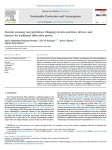
Article
The Circular Economy (CE) has notable potential for the economic, environmental, and social sustainability of agriculture. However, the literature on the CE has focused on the industrial sector, leaving significant gaps in the analysis of sustai[...]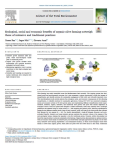
Article
Olive farming has vastly intensified across the Mediterranean basin recently. This ongoing process has detrimental social and environmental outcomes, but it also represents a unique opportunity to study the impacts of intensification and identif[...]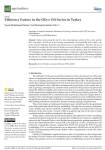
Article
Turkey ranks among the top five olive oil-producing countries in the world, and the olive crop plays a crucial role in its economy, economically, environmentally, and socially. One of the primary challenges facing the agricultural sector is its [...]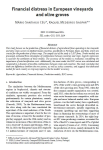
Article
This study focuses on the prediction of financial distress of agricultural firms operating in the vineyards and olive crops sectors in Mediterranean countries, specifically in Portugal, Spain, and Italy, which are crucial for the production of t[...]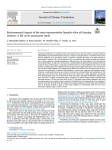
Article
Agricultural production is an essential activity in the global economy that must advance towards the design of sustainability projects hand-in-hand with consumers, companies, and policymakers. An exhaustive study, in line with the guidelines set[...]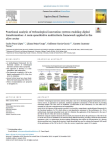
Article
CONTEXT Technological innovation systems (TIS) play a key role in facilitating digital transformation (DT) in various sectors. In agriculture in particular, traditional qualitative assessments of TIS fall short of providing actionable insights. [...]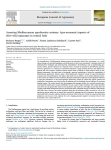
Article
The intensification of Mediterranean farming systems has adversely affected the environment. As a result, climate change, soil and land degradation, and biodiversity loss have been exacerbated. A potential solution for addressing these challenge[...]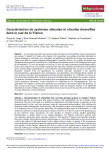
Article
Les systèmes diversifiés sont associés à plus de résilience et de durabilité, mais sont aujourd’hui mal connus. L’objectif de l’étude est de repérer et de caractériser les systèmes diversifiés alternatifs au modèle dominant en oléiculture et en [...]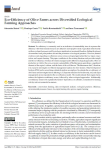
Article
Eco-efficiency is commonly used as an indicator of sustainability since it expresses the efficiency with which natural resources are utilized to meet people's needs. Agriculture relies heavily on these ecological resources and by-produces signif[...]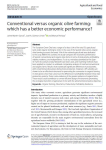
Article
The European Green Deal sets a target of at least 25% of the total EU agricultural land under organic farming by 2030. In the case of the Spanish olive sector, organic olive farming accounts for barely 10% of the national agricultural area dedic[...]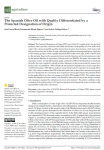
Article
The Protected Designation of Origin (PDO), part of the EU’s quality policy for agri-food products, aims to provide consumers with reliable information on the quality of a food, linked to its origin. Olive oil has perceptible qualities deri[...]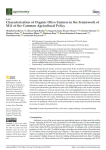
Article
O. Parra Rivero ; A. Ojeda Roldan ; R. González Álvarez-Ossorio ; C. Staboulis ; D. Natos ; K. Mattas ; W. Bojar ; R. Kusmierek-Tomaszewska ; P. Baranowski ; J. Krzyszczak |During the last decade, Common Agricultural Policy (CAP) has prioritised measures focused on sustainability and quality over production. The purpose of the AGRICORE project is to develop a tool based on agent-based modelling to assist policymake[...]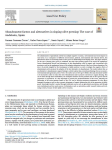
Article
The abandonment of agricultural activity has multiple negative economic, environmental and social impacts in rural areas. As a consequence of different socioeconomic, political, environmental and technical drivers, this phenomenon shows an incre[...]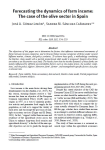
Article
The objectives of this paper are to determine the factors that influence interannual movements of farms between income categories, and to forecast future income categories of farms under several different market, climate, and policy scenarios. T[...]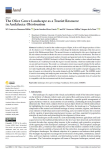
Article
Andalucía, located in the southern region of Spain, is the world’s largest producer of olive oil. It is home to over 70 million olive trees, which shape the distinctive landscape of the olive groves typical of the Mediterranean Basin. This resea[...]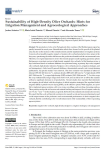
Article
The production of olive oil in Portugal and other countries of the Mediterranean region has greatly increased in recent years. Intensification efforts have focused on the growth of the planted area, but also on the increase of the orchards densi[...]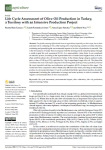
Article
The global warming fight should focus on agriculture, especially on olive crops, due to their potential role in combating it. One of the leading olive oil-producing countries is Turkey; therefore, evaluating and quantifying the environmental imp[...]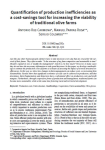
Article
Just like any other businesspeople, farmers have to take decisions every day that are crucial for the survival of their farms. They often wonder “Is the structure of my farm competitive and sustainable in time? Should I expand its size or modify[...]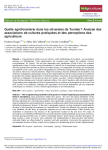
Article
L’association de cultures avec les oliviers – arbre emblématique de la région – est une pratique ancienne en Méditerranée. Cette agroforesterie est reconnue pour fournir de multiples services écosystémiques. En Tunisie, l’un des plus[...]










